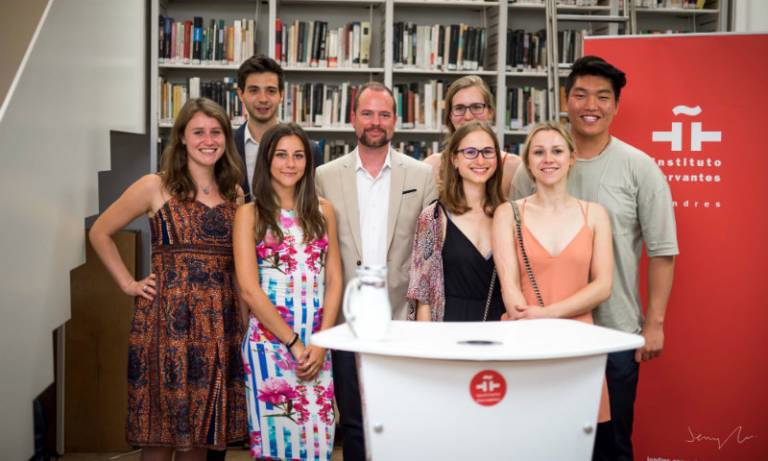Undergraduates showcase their original fiction at book launch
28 June 2017
Seven alumni and current students from UCL SELCS showcased an anthology of their original Spanish fiction to peers, publishers, & Spanish cultural leaders at an event to celebrate the book’s launch.

The event, held at the Instituto Cervantes in London on Wednesday 21 June, marked the publication of an anthology of the students’ 50 pieces of microfiction, titled Entre ínsulas y penínsulas: Haiku narrativo y otros microcuentos, which was published in Seville earlier this year.
The School of European Languages, Culture, and Society (SELCS) students previously performed their work, pre-publication, in Spanish and in translation, at UCL’s Festival of Culture in 2016.
They also received a letter from José María Merino, a prominent author and member of the Royal Academy of Spanish, praising their achievement. Merino, whose letter itself takes the form of a short story, comments: “This delectable little book has managed to cross the frontier between waking and dreaming.”
Francesc Puértolas, Head of Cultural Activities at the Instituto Cervantes, welcomed the young authors and remarked upon the strong intercultural awareness their book encapsulates. The students performed their original microfiction, alternating between Spanish and English renderings, with key involvement of the audience. The audience included representatives from Extra Radio 1, London’s preeminent Hispanic radio channel, and from Penguin Random House.
Kate George, a student who presented at the event, said: “The book project really allowed us to push the limits of our creativity.”
Another student presenter, Charlotte Toon, said: "It was an honour to be able to launch our microfiction book at the Instituto Cervantes and I thoroughly enjoyed the evening. It was great to receive so much positive feedback from those who attended and of course a fantastic opportunity to hear the work of the other incredible writers who attended."
The launch of the book is borne out of Dr Fisher’s innovative final-year undergraduate module, which gives students the opportunity to write their own Spanish microfiction, culminating in a portfolio of original work. Alongside this, students rigorously analyse Spanish texts and critique one another's work collaboratively. The module is the first of its kind to be dedicated to creative writing in Spanish at UCL and the wider University of London.
Dr Tyler Fisher, Lecturer in Spanish Peninsular Literary Studies at UCL, said: “The fact that our undergraduates and recent alumni have succeeded in publishing their original fiction in Spain speaks very highly of their linguistic skill and their creative abilities.” The module embodies dimension five of UCL's Connected Curriculum framework, where students learn to produce outputs directed at an audience, communicating their new learning with those beyond UCL.
Anthony McNeill (SELCS Undergraduate and Examinations Tutor) said: “Tyler’s module has played an important role in encouraging a shift towards a departmental culture that is more open to innovation in curriculum and assessment design. An exciting new degree programme under development, ‘Creative Writing and Translation’, takes its cue from the microfiction module and attempts to create a similar hybrid space between foreign language learning, close analytical reading, and creative writing activities”.
The successful evening at the Instituto Cervantes could become an annual event. It provides an excellent venue for UCL students to exhibit their creative efforts in Spanish at Spain’s leading cultural centre in London, where they can connect with an audience, cultivate a readership, and establish links with wider Hispanic networks. The graduating cohort of current finalists, who have written more than 100 stories in Spanish this year, will also endeavour to assemble a publishable anthology of their best work. They will present a selection of their Spanish writing on ZTR Radio’s programme, “El ojo de la cultura hispanoamericana”, on 10 July 2017.
- Encouraging students to reflect through supportive but critical peer scrutiny: a case study on this project
 Close
Close

